- Home
- Albert Camus
Les Justes
Les Justes Read online
The Just
(Les Justes)
written by Albert Camus
translated from the French by Suzanne M. Saunders
Translator’s Introduction
Author's Introduction
Act 1
Act 2
Act 3
Act 4
Act 5
Translator’s Introduction
I first read this play in my junior year of high school, in a third-year International Baccalaureate French class. My teacher admitted to us that it was chosen for us to read because it was the shortest thing on the list of works in French approved by the IB for their French-as-a-second-language classes. Also, being a play, it does not make much use of the complicated French literary verb tenses.
Despite this evidence that it could have been much more difficult, my classmates were never much for this play. That's really the standard American reaction to having to read something in another language, and also possibly to the content; you can see why a play about the ethics and emotions of a group of socialist terrorists would not gain much popularity in the United States. Even though Camus was once characterized by my friend Rob as "the Friendly Existentialist" (certainly so, compared to reading Sartre) and The Stranger is standard fare in literature classes.
Nonetheless, the play moved me to tears when I first read it; the only other literary work to accomplish that was Romeo and Juliet (from which the beginning epigraph of The Just comes, oddly enough). It's so beautiful in French, but I never could find an English translation that did it justice. For example, the one in the University of South Florida library, translated by Stuart Gilbert, renders the play's title as The Just Assassins, despite the main character's cry in Act 4, "Je vous interdis d'employer ce mot" (I forbid you to use that word) when what he has done is referred to as "l'assassinat" (the assassination).
So I translated it myself. The first version was done during the summers of 1991 and 1992, not long after the two years of going over it in French class. But I did some editing before putting it up to smooth out my old tendency to translate literally at the expense of smooth flow in English.
I hope someone likes it, and that this sadly overlooked play becomes more well-known. I think understanding what drives people to extremes for the sake of a cause is even more vital now than it was when the play was written in 1949.
The Just Ones (Les Justes)
Author's Introduction
In February 1905, in Moscow, a group of terrorists who were part of the revolutionary socialist party organized an attempt on the life of the Grand Duke Serge, uncle of the Tsar. This attempt, and the unusual circumstances leading up to and following it, are the subject of The Just. No matter how extraordinary some of the situations in this play may seem, they are the truth. This is not to say that The Just is a historical play. But all the characters did actually exist, and behaved as I have written. I only tried to make realistic the things which really happened.
I kept the real name of the hero, Kaliayev. I didn't do this from lack of imagination, but out of respect and admiration for those men and women who, in the most contemptible of efforts, were still not able to get rid of their own hearts. Progress has been made since then, it is true, and the hate which weighed down those exceptional souls into intolerable suffering has now become a comfortable system. But that is even more reason to bring back these great ghosts and the story of their justified revolt, their difficult brotherhood, and the unmeasurable efforts they made to put themselves in tune with murder -- and thus to show where their true faith lay.
-- Albert Camus, 1949
* * *
O love! O life! Not life but love in death.
Romeo and Juliet, Act IV, Scene 5
* * *
Dramatis Personae
Dora Doublebov
Boris "Boria" Annenkov
Stepan Fedorov
Alexis Voinov
Ivan "Yanek" Kaliayev
The guard
Foka
Skouratov
The Grand Duchess
The Just
Act I
(The terrorists' apartment. Morning. The curtain goes up in silence. Dora and Annenkov are onstage without moving. There is a single knock at the door. Anenkov gestures to silence Dora, who seems to want to speak. Two more knocks.)
Annenkov: It's him. (He leaves the stage. Dora waits, still without moving. Annenkov returns with Stepan, who he takes by the shoulders.) It's him! Stepan's back.
Dora (going to Stepan and taking his hand) It's great to see you again, Stepan!
Stepan: Hello, Dora.
Dora (looking at him): It's been three years already.
Stepan: Yep, three years. The day they arrested me, I was coming back to join you.
Dora: We were waiting for you then. It got later and later, and my heart beat faster and faster. We were so scared we couldn't look each other in the face.
Annenkov: We had to change apartments again.
Stepan: I know.
Dora: And there, Stepan?
Stepan: Where?
Dora: In prison?
Stepan: You can escape from prison.
Annenkov: Yes. We were very happy when we learned that you had gotten to Switzerland.
Stepan: Switzerland was just another prison, Boria.
Annenkov: What do you mean? At least they're free there.
Stepan: Liberty is still a prison long as there is still anyone in chains on earth. When I was free, I could not stop thinking of Russia and all its slaves. (Silence.)
Annenkov: I'm glad the party sent you here.
Stepan: It was necessary. I'm finally ready to act. (Looking at Annenkov) We're going to kill him, right?
Annenkov: I'm certain of it.
Stepan: We will kill that murderer. You're the leader, Boria, and I will obey you.
Annenkov: I don't need any promises, Stepan. We're all brothers here.
Stepan: We need discipline. I started to understand that in prison. The revolutionary socialist party needs discipline. With that discipline, we will kill the Grand Duke and we will destroy this tyranny.
Dora (going towards him): Sit down, Stepan. You must be tired after that long trip.
Stepan: I'm never tired. (Silence. Dora goes to sit down.) Is everything ready, Boria?
Annenkov, changing his tone: For a month, two of our people have been watching the Grand Duke's movements. And Dora's gathered together everything we'll need.
Stepan: Is the proclamation ready?
Annenkov: Yes. All of Russia will know that the Grand Duke was executed by a bomb from the combat division of the revolutionary socialist party, to hurry the liberation of the Russian people. The imperial palace will know that we've decided to keep up the terror until the land is given back to the people. Yes, Stepan, yes, everything is ready. The moment is coming.
Stepan: What must I do?
Annenkov: For now, you can help Dora. Schweitzer, who you're replacing, worked with her.
Stepan: He died?
Annenkov: Yeah.
Stepan: How?
Dora: An accident. (Stepan looks at Dora, who looks away.)
Stepan: Then?
Annenkov: After that we'll see. You must be ready to replace us, in case of an emergency, and maintain the liaison with the Central Committee.
Stepan: Who else is here?
Annenkov: You met Voinov in Switzerland. I have a lot of confidence in him, even though he's young. You don't know Yanek.
Stepan: Yanek?
Annenkov: Kaliayev. We also call him the Poet.
Stepan: That's a dumb name for a terrorist.
Annenkov (laughing): Yanek wouldn't say so. He says that poetry is revolutionary.
Stepan: Only bombs are revolutionary. (Silence.)
Dora, do you think I can help you?
Dora: Yes, you just have to be careful not to break the tubes.
Stepan: And if they break?
Dora: That's how Schweitzer died. (A short time.) Why are you smiling, Stepan?
Stepan: Am I smiling?
Dora: Yes.
Stepan: That happens to me sometimes. (A short time. Stepan seems to be thinking.) Dora, would one bomb blow up this whole building?
Dora: Just one, no. But it would be in bad condition inside.
Stepan: How many to blow up Moscow?
Annenkov: You're crazy! What do you mean?
Stepan: Oh, nothing. (A knock. Everyone waits. Two more knocks. Annenkov goes into the antechamber and comes back with Voinov.)
Voinov: Stepan!
Stepan: Hello. (They shake hands. Voinov goes to Dora and hugs her.)
Annenkov: Everything went well, Alexis?
Voinov: Yes.
Annenkov: You studied the route to the theater?
Voinov: I can draw it. Look. (He draws.) Turns, retraced roads, obstacles...the carriage will go under our window.
Annenkov: What are these x's?
Voinov: A little place where the horses go around, and the theater where they stop. In my opinion, those are the best places.
Stepan: The informers?
Voinov, hesitantly: We've got a bunch.
Stepan: Do they worry you?
Voinov: I'm not comfortable.
Annenkov: No one's comfortable around them. Don't worry.
Voinov: I'm not afraid of anything. I'm not used to lying, that's all.
Stepan: Everybody lies. All you need is to lie well.
Voinov: That's not easy. When I was a college student, my friends made fun of me because I couldn't. I said what I thought. Finally, they threw me out of the university.
Stepan: Why?
Voinov: In history class, the professor asked me how Peter the Great had built St. Petersburg.
Stepan: Good question.
Voinov: With blood and whips, I said. I was kicked out of the place.
Stepan: And then?
Voinov: I understood that it wasn't enough to speak against injustice. You have to give your life to fight it. Now, I'm happy.
Stepan: And now, you lie?
Voinov: I lie. But I won't be lying anymore the day I throw the bomb. (Two knocks, then one more. Dora hurries to the door.)
Annenkov: It's Yanek.
Stepan: That wasn't the same signal.
Annenkov: Yanek likes to mess with it. He has his own personal signal. (Stepan shrugs. Dora's voice is heard in the antechamber. Enter Dora and Kaliayev, holding hands, Kaliayev laughing.)
Dora: Yanek, this is Stepan, the one who's replacing Schweitzer.
Kaliayev: Welcome, brother.
Stepan: Thank you. (Dora and Kaliayev go sit down, facing the others.)
Annenkov: Yanek, are you sure you'll recognize the carriage?
Kaliayev: Yes, I went over it twice. I could pick it out of a thousand. I noted all the details. For instance, one pane of glass on the left lantern is broken.
Voinov: And the informers?
Kaliayev: Plenty of 'em. But we're old friends. They buy me cigarettes. (He laughs.)
Annenkov: Did Pavel confirm what we've got?
Kaliayev: The Grand Duke will go to the theater this week. Soon, Pavel will know the exact day and will leave a message with the doorman. (He turns toward Dora and laughs.) We are lucky, Dora.
Dora, looking at him: You aren't a vendor anymore? Now you're a great lord. You look so good. Don't you regret giving up your disguise?
Kaliayev (laughing): It's true I was very proud of it. (To Stepan and Annenkov.) I spent two months observing the vendors, and more than a month practicing in my room. The rest of them never had a clue. "A great salesman," they said. "He could sell horses to the tsar." And they all tried to copy me.
Dora: Naturally, you laugh.
Kaliayev: You know I can't help it. This disguise, this new life, everything amuses me.
Dora: I don't like disguises. (She shows off her dress.) This fancy outfit! Boria could have gotten me something else. My heart is simple.
Kaliayev, laughing: You look beautiful in that dress.
Dora: Beautiful! I am happy to be. But we don't need to think about it.
Kaliayev: Why not? Your eyes are always sad, Dora. You need to be happy, you need to be proud. Beauty exists, joy exists! "In the tranquil places where my heart wishes you..."
Dora (smiling): "...I breathe in an eternal summer..."
Kaliayev: Oh! Dora, you remember that verse. And you smile? I am so happy.
Stepan, cutting them off: We're losing time. Boria, I suppose we'll need to warn the doorman? (Kaliayev looks at him, astonished.)
Annenkov: Yes. Dora, would you go do it? Don't forget the tip. Then Voinov will help you get everything together in the bedroom. (They leave. Stepan walks toward Annenkov with a determined step.)
Stepan: I want to throw the bomb.
Annenkov: No, Stepan. I've already decided who'll do it.
Stepan: I'm begging you. You know what this means to me.
Annenkov: No. Rules are rules. (A silence.) I won't be throwing it either; I have to wait here. The rules are hard on everyone.
Stepan: Who is throwing the first bomb?
Kaliayev: Me. Voinov is throwing the second.
Stepan: You?
Kaliayev: That surprises you? Don't you have confidence in me?
Stepan: You need experience.
Kaliayev: Experience? You know very well that you only throw it once and then...No one has ever thrown two bombs.
Stepan: You must have a firm hand.
Kaliayev (showing his hands): Look. Do you think they'll shake? (Stepan turns away.) They never shake. What? I will have that tyrant in front of me, do you think I will hesitate? How can you believe that? And even if my hands did shake, I know another way to kill the Grand Duke.
Annenkov: How?
Kaliayev: Throw myself under the horses' feet. (Stepan hunches his shoulders and goes to sit down in the back.)
Annenkov: No, that's not necessary. You must try to survive. The Organization needs you, you must preserve yourself.
Kaliayev: I will obey, Boria! What an honor, what an honor for me! Oh, I will be worthy of it.
Annenkov: Stepan, you'll be in the street while Yanek and Alexis go for the carriage. You will pass beneath our windows and we'll have a signal. Dora and I will wait here until time to release the proclamation. With any luck, the Grand Duke will be destroyed.
Kaliayev (in exultation): Yes, I will destroy him! How great it will be if we succeed! The Grand Duke is nothing. We will strike higher.
Annenkov: First the Grand Duke.
Kaliayev: And if we fail, Boria? We will have to imitate the Japanese.
Annenkov: What do you mean?
Kaliayev: During war, the Japanese don't surrender. They kill themselves.
Annenkov: No. Don't think about suicide.
Kaliayev: Of what then?
Annenkov: Of the new terror we'll make.
Stepan (speaking from the back): To kill yourself, you must love yourself an awful lot. A true revolutionary cannot love himself.
Kaliayev (turning back to him quickly): A "true" revolutionary? Why are you treating me like this? What have I done to you?
Stepan: I don't like people who enter the revolution because they're bored.
Annenkov: Stepan!
Stepan (getting up and coming over to them): Yes, I'm brutal. But for me, hate is not a game. We are not here to admire ourselves. We are here to succeed.
Kaliayev (softly): Why do I offend you? Who said I was bored?
Stepan: I don't know. You change the signals, you like playing a vendor, you recite poetry, you want to throw yourself under the horses' feet, and now, suicide. (Looking at him) I don't have confidence in you.
Kaliayev: You don't know me, brother. I love life. I am not bo
red. I entered the revolution because I love life.
Stepan: I don't love life; I love justice, which is higher than life.
Kaliayev (with a visible effort): Each person serves justice however he can. We must accept that we are different. We must love each other, if we can.
Stepan: We can't.
Kaliayev: So what are you doing with us?
Stepan: I came here to kill a man, not to love one or to salute our differences.
Kaliayev (violently): You aren't killing him in the name of nothing. You kill him with us and in the name of the Russian people. That's your justification.
Stepan (in the same manner): I don't need it. I was justified in one night, for always, three years ago, in prison. And I will not support...
Annenkov: Enough! Are you both crazy? Don't you realize who we are? We're brothers, some confused by others, but working toward the execution of tyrants, for the liberation of this country! We kill together, and nothing can separate us. (Silence. He looks at them.) Come on, Stepan, we need to figure out the signals. (Stepan leaves. To Kaliayev) It's nothing. Stepan's been through a lot. I'll talk to him.
Kaliayev (very pale): He insulted me, Boria. (Enter Dora.)
Dora (seeing Kaliayev): What's wrong?
Kaliayev: We are already fighting. He doesn't like me. (Dora sits down, in silence for a minute.)
Dora: I don't think he likes anybody. When everything is done, he'll be happier. Don't be sad.
Kaliayev: I am sad. I need to be liked by all of you. I gave up everything for this revolution. How can I face it if my brothers turn away from me? Sometimes I get the feeling that they don't understand me. Is it my fault? I am clumsy, I know.
Dora: They like you and they understand you. Stepan is different.
Kaliayev: No. I know what they think. Schweitzer already said it. "Too weird to be a revolutionary." I would like to explain to them that I am not weird. They think I'm crazy, too spontaneous. However, like them, I believe in the idea. Like them, I want to sacrifice myself. Me too, I can be skilled, quiet, lying, hiding myself. But life still seems marvelous to me. I love beauty, happiness! That's why I hate tyranny. How can I explain it to them? The revolution, of course! But a revolution for life, to give people a chance at life, understand?

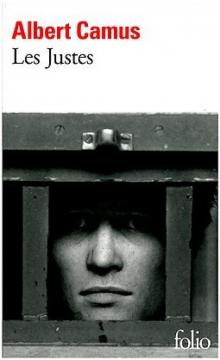 Les Justes
Les Justes The Sea Close By
The Sea Close By The Stranger
The Stranger The Rebel: An Essay on Man in Revolt
The Rebel: An Essay on Man in Revolt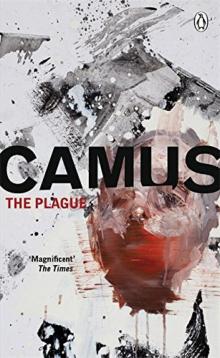 The plague
The plague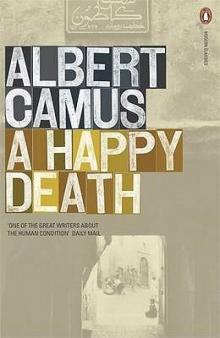 A Happy Death
A Happy Death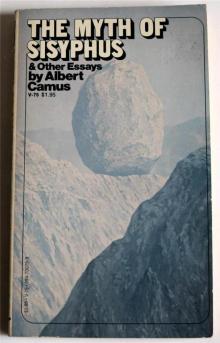 The Myth of Sisyphus and Other Essays
The Myth of Sisyphus and Other Essays The Fall
The Fall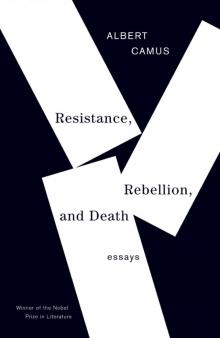 Resistance, Rebellion, and Death
Resistance, Rebellion, and Death The First Man
The First Man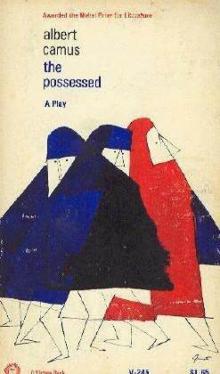 The Possessed
The Possessed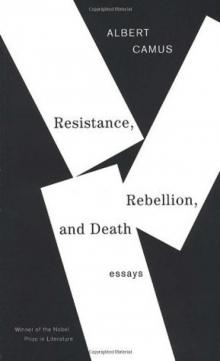 Resistance, Rebellion and Death: Essays
Resistance, Rebellion and Death: Essays